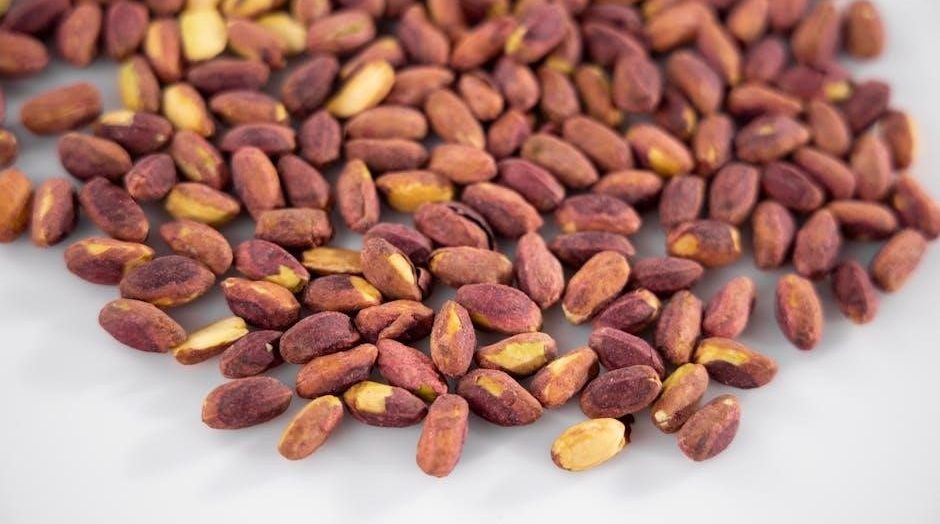A high protein, low carb vegetarian diet combines plant-based protein sources with minimal carbohydrate intake, promoting weight loss, muscle maintenance, and overall health;
Understanding the Basics of a High Protein Low Carb Vegetarian Diet
This diet focuses on balancing plant-based protein sources like legumes, eggs, and dairy with minimal carbohydrate intake; It emphasizes whole, nutrient-dense foods such as vegetables, nuts, and seeds while avoiding high-carb grains and sugars. The plan prioritizes healthy fats to maintain energy and satisfaction, ensuring a balanced approach to weight management and muscle maintenance. By combining these elements, it offers a sustainable and nutritious path to achieving health goals.
Importance of Protein and Low Carb in a Vegetarian Diet
Protein is essential for muscle repair and growth, while low-carb intake helps regulate blood sugar and promote fat burning. In a vegetarian diet, prioritizing protein sources like beans, lentils, and dairy ensures adequate nutrition. Reducing carbohydrates, especially refined ones, helps maintain energy balance and supports weight management. This combination fosters a healthier metabolic state, making it easier to achieve and maintain a balanced, energetic lifestyle.
Benefits of a High Protein Low Carb Vegetarian Diet
A high protein, low carb vegetarian diet promotes weight loss, improved body composition, enhanced muscle growth, and better blood sugar control, supporting overall health and wellness.
Weight Loss and Improved Body Composition
A high protein, low carb vegetarian diet is highly effective for weight loss and improving body composition. The combination of lean protein sources like tofu, legumes, and nuts with minimal carbs helps reduce insulin levels, promoting fat burning. This approach preserves muscle mass while shedding fat, leading to a more toned physique. Meal plans rich in fiber and healthy fats further enhance satiety and metabolic efficiency, making it easier to achieve and maintain weight loss goals naturally.
- Focuses on plant-based proteins
- Reduces carbohydrate intake
- Promotes fat loss while maintaining muscle
Enhanced Muscle Growth and Maintenance
A high protein, low carb vegetarian diet supports muscle growth by providing essential amino acids through plant-based sources like legumes, tofu, and quinoa. These foods help repair and build muscle tissue, making them ideal for fitness enthusiasts. The diet’s focus on lean proteins and healthy fats aids in muscle recovery and growth, while minimizing carb intake ensures sustained energy for workouts. This combination is particularly effective for those engaging in strength training or resistance exercises.
- Plant-based proteins promote muscle repair
- Low carb intake supports sustained energy
- Combines well with strength training
Improved Blood Sugar Control
A high protein, low carb vegetarian diet helps regulate blood sugar levels by minimizing carbohydrate intake, which reduces insulin spikes. Plant-based proteins like legumes, tofu, and lentils provide sustained energy without causing rapid glucose fluctuations. This dietary approach is particularly beneficial for individuals with diabetes or prediabetes, as it promotes stable blood sugar levels and enhances insulin sensitivity over time;
- Reduces carbohydrate-induced insulin spikes
- Plant-based proteins offer sustained energy
- Supports insulin sensitivity and glucose balance
Key Foods for a High Protein Low Carb Vegetarian Diet
Focus on protein-rich foods like tofu, tempeh, seitan, legumes, nuts, seeds, and low-carb vegetables to build a balanced and nutritious meal plan effortlessly.
- Tofu and tempeh
- Legumes (lentils, chickpeas)
- Nuts and seeds
- Low-carb vegetables
Best Vegetarian Protein Sources
Vegetarian protein sources are essential for a high-protein, low-carb diet. Tofu, tempeh, lentils, chickpeas, and nuts are excellent options. Quinoa, edamame, and spirulina also provide ample protein.
- Tofu and tempeh offer versatile, high-protein options.
- Lentils and chickpeas are rich in protein and fiber.
- Nuts and seeds provide healthy fats and protein.
- Quinoa is a complete protein and low in carbs.
- Edamame and spirulina are plant-based protein powerhouses.
Low Carb Vegetarian Food Options
Low-carb vegetarian options focus on non-starchy vegetables, healthy fats, and protein-rich foods. Leafy greens like spinach and kale, mushrooms, and broccoli are excellent choices. Avocados, nuts, and seeds provide healthy fats. Fermented foods like sauerkraut and kimchi add flavor and nutrients. Tofu and tempeh, when prepared without added carbs, fit well. These options are nutrient-dense and align with a low-carb, plant-based lifestyle, ensuring variety and satisfaction.
- Leafy greens: spinach, kale, arugula.
- Cruciferous vegetables: broccoli, cauliflower.
- Avocados for healthy fats.
- Nuts and seeds for crunch and nutrition.
- Fermented foods like sauerkraut and kimchi.
- Mushrooms for umami flavor.
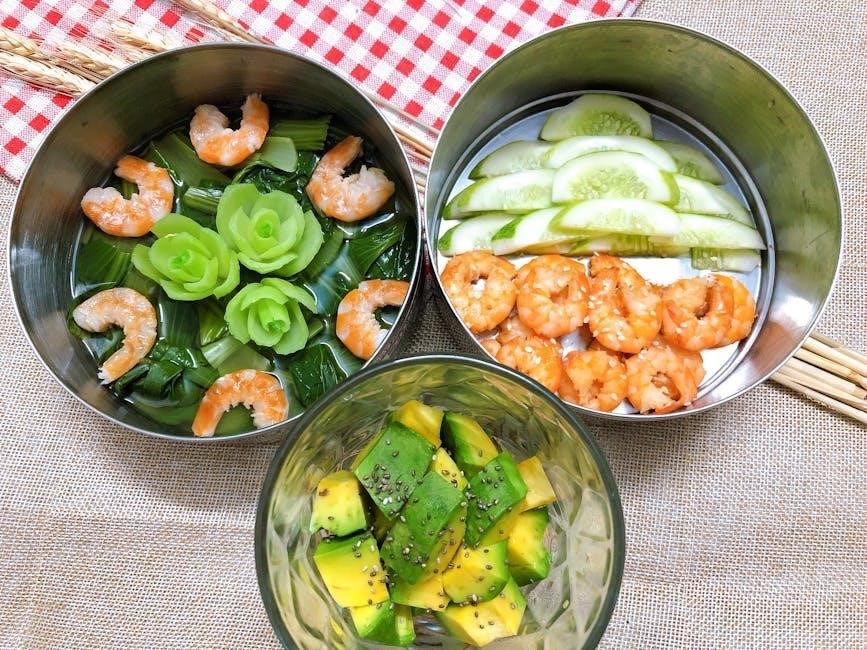
How to Plan a High Protein Low Carb Vegetarian Diet
Plan by identifying high-protein vegetarian foods, reducing carb intake, and balancing fats. Focus on meal prep, portion control, and nutrient-dense options for a sustainable diet.
Identifying High Protein Vegetarian Foods
Focus on plant-based protein sources like beans, lentils, tofu, tempeh, and seitan. Eggs and dairy products, such as Greek yogurt and cottage cheese, are excellent options. Incorporate nuts, seeds, and whole grains like quinoa and farro. Don’t forget protein-rich vegetables like spinach and broccoli. For convenience, consider vegetarian protein powders. These foods provide adequate protein while keeping carbs low, ensuring a balanced and nutritious diet.
Reducing Carb Intake in a Vegetarian Diet
Focus on limiting starchy foods like grains, legumes, and root vegetables. Opt for non-starchy options such as leafy greens, broccoli, and cauliflower. Incorporate healthy fats like avocado, nuts, and olive oil to keep meals satisfying. Choose low-carb alternatives to traditional staples, such as zucchini noodles or shirataki rice. Prioritize whole, unprocessed foods to naturally reduce carbohydrate consumption while maintaining nutrient balance and supporting weight management goals.
Balancing Fats for Optimal Health
In a high protein, low carb vegetarian diet, healthy fats are essential for satiety and nutrient absorption. Include sources like avocado, nuts, seeds, and olive oil, which provide monounsaturated and polyunsaturated fats. Moderate amounts of saturated fats from dairy or coconut oil can also be beneficial. Aim for a balance that supports heart health and energy levels while keeping overall calorie intake in check for weight management and improved metabolic function.
Sample High Protein Low Carb Vegetarian Meal Plans
Discover delicious and nutritious meal plans tailored to your dietary needs. Explore protein-rich dishes like tofu stir-fries, lentil salads, and quinoa bowls, all low in carbs.
Day-by-Day Meal Plan Examples
Start your week with a veggie omelet and avocado slices for breakfast. Lunch could feature a hearty lentil salad, while dinner includes grilled tofu with roasted vegetables. Mid-morning snacks like Greek yogurt with berries keep energy levels steady. Incorporate variety with quinoa bowls, chickpea stir-fries, and spinach smoothies. Each meal is crafted to balance protein, fats, and low carbs, ensuring nutrient-dense and flavorful options throughout the day.
7-Day High Protein Low Carb Vegetarian Meal Plan
- Day 1: Veggie omelet, lentil salad, and grilled tofu with broccoli.
- Day 2: Greek yogurt with berries, spinach smoothie, and quinoa bowl with chickpeas.
- Day 3: Cottage cheese toast, roasted chickpeas, and stuffed bell peppers with beans.
- Day 4: Protein smoothie, avocado wrap, and tofu stir-fry with greens.
- Day 5: Veggie frittata, hummus with veggies, and lentil curry with cauliflower rice.
- Day 6: Chia pudding, grilled portobello mushrooms, and zucchini noodles with pesto.
- Day 7: Egg scramble, kale salad, and tempeh with roasted vegetables.
This plan offers balanced, protein-rich meals while keeping carbs low, ensuring variety and nutrition throughout the week. Customize based on preferences and dietary needs for optimal results.
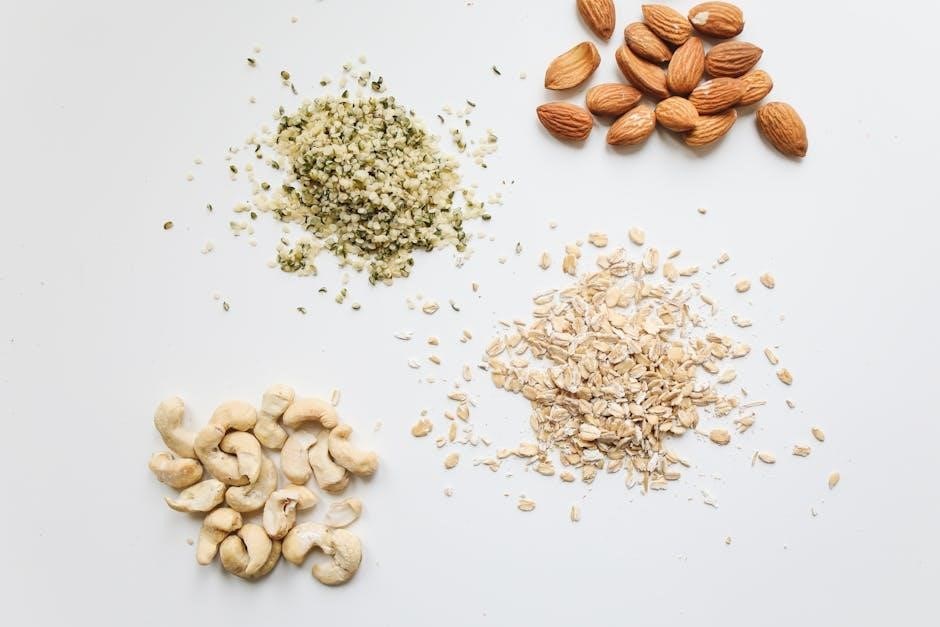
Tips for Weight Loss on a High Protein Low Carb Vegetarian Diet
Focus on portion control, balance fats, and stay hydrated. Incorporate strength training and track progress to optimize results and maintain motivation throughout your journey.
Portion Control and Calorie Management
Managing portions and calories is essential for effective weight loss. Use a food scale or measuring cups to ensure accurate serving sizes. Track your daily intake with a journal or app to stay accountable. Focus on nutrient-dense foods and avoid overeating, even on healthy options. Set realistic calorie goals based on your activity level and goals. Mindful eating habits, like savoring meals, can also help prevent overconsumption and support long-term success.
Incorporating Physical Activity
Regular exercise complements a high protein, low carb vegetarian diet by boosting metabolism and aiding weight loss. Aim for 150 minutes of moderate-intensity aerobic activity, such as brisk walking or cycling, weekly. Include strength training to build muscle and enhance protein utilization. High-intensity interval training (HIIT) can also accelerate fat loss. Pairing physical activity with a balanced diet maximizes results, ensuring sustainable weight management and improved overall health. Consistency is key to achieving long-term fitness and dietary goals.
Overcoming Plateaus
Plateaus in weight loss or progress can occur due to metabolic adaptation or insufficient calorie burn. To overcome this, vary protein sources, adjust macronutrient ratios, and incorporate HIIT workouts. Ensure adequate hydration and sleep, as these factors influence metabolism. Intermittent fasting or carb cycling can also reignite progress. Track daily intake and activity to identify gaps, and seek professional guidance if needed. Consistency and patience are key to breaking through plateaus and achieving long-term success in your high protein, low carb vegetarian journey.
Grocery List for a High Protein Low Carb Vegetarian Diet
Essential items include tofu, tempeh, legumes, Greek yogurt, cottage cheese, nuts, seeds, and low-carb vegetables. Incorporate protein powders and healthy oils for balanced nutrition.
Essential Foods to Include
A well-rounded list includes high-protein options like tofu, tempeh, legumes, Greek yogurt, and cottage cheese. Incorporate low-carb vegetables such as spinach, broccoli, and bell peppers. Nuts, seeds, and healthy oils like flaxseed oil are also key. Protein powders and whole grains like quinoa can be added for variety. These foods provide balanced macronutrients, supporting weight management and muscle maintenance while offering natural fiber and essential vitamins.
Snacks and Meal Prep Ideas
Snacks like roasted chickpeas, Greek yogurt, and hard-boiled eggs provide quick protein boosts. Meal prep ideas include overnight oats with protein powder, stuffed bell peppers with quinoa, and veggie stir-fries with tofu or tempeh. Prepare low-carb wraps with hummus and veggies, or portion out mixed nuts and seeds for easy grabs; These options are convenient, nutritious, and align with a high-protein, low-carb vegetarian lifestyle, ensuring variety and satisfaction throughout the day.
Health Considerations and Risks
A high protein, low carb vegetarian diet may pose risks like nutrient deficiencies or increased heart disease risk. Ensure balanced nutrition and consult a healthcare provider.
Potential Nutritional Deficiencies
A high protein, low carb vegetarian diet may lead to deficiencies in essential nutrients like vitamin B12, iron, and omega-3 fatty acids. Plant-based proteins often lack certain amino acids found in animal products. Additionally, restricting carbs can limit fiber intake, potentially affecting digestion. Low carb diets may also reduce intake of whole grains, which are rich in vitamins and minerals. Ensuring a balanced intake of fortified foods, supplements, and diverse plant-based sources is crucial to mitigate these risks.
Long-Term Health Implications
Adhering to a high protein, low carb vegetarian diet long-term may impact heart health due to high intake of certain proteins and reduced fiber from whole grains. Some studies link such diets to increased heart disease risks. However, balanced plans emphasizing plant-based proteins and healthy fats can mitigate these risks. Regular health check-ups and consultations with nutritionists are recommended to ensure the diet remains beneficial and sustainable for overall well-being over time.
Exercise and Fitness on a High Protein Low Carb Vegetarian Diet
Combining regular exercise with a high protein, low carb vegetarian diet enhances muscle growth and endurance, making the plan effective for long-term fitness and weight management goals.
Exercise Routine for Muscle Maintenance
A well-rounded exercise routine is essential for muscle maintenance on a high protein, low carb vegetarian diet. Incorporate strength training, cardio, and flexibility exercises to build and sustain lean muscle mass. Aim for 3-4 sessions per week, combining activities like weight lifting, resistance band workouts, and yoga. Pairing regular physical activity with adequate protein intake ensures optimal muscle repair and growth, supporting overall fitness goals effectively.
Role of Exercise in Weight Loss
Exercise plays a crucial role in weight loss by increasing caloric expenditure and enhancing metabolism. Combining a high protein, low carb vegetarian diet with regular physical activity accelerates fat burning and preserves lean muscle. Cardio exercises like running or cycling boost heart rate, while strength training builds muscle mass, further aiding weight loss. Consistency in exercise routines ensures sustainable results, making it a vital complement to dietary efforts for achieving and maintaining a healthy weight.
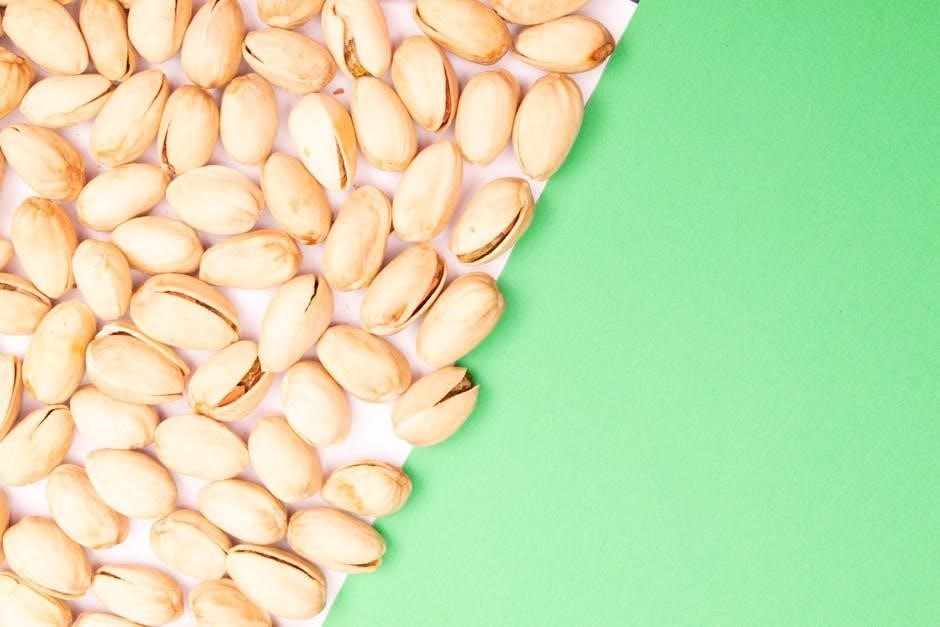
Free High Protein Low Carb Vegetarian Diet Plan PDF Resources
Discover free downloadable PDF guides offering comprehensive high-protein, low-carb vegetarian meal plans, complete with recipes and grocery lists for effective weight management and muscle growth support.
Where to Find Reliable PDF Guides
Reliable high-protein, low-carb vegetarian diet PDF guides can be found on reputable health and wellness websites, nutrition blogs, and platforms offering customizable meal plans. Many sites provide free downloadable resources, such as 7-day meal plans with detailed schedules and nutritional analyses. Websites like Pinterest and Google Search often feature these guides, ensuring access to structured, easy-to-follow plans tailored to vegetarian preferences. These resources typically include grocery lists and recipes, making meal prep and planning convenient.
How to Use a PDF Meal Plan Effectively
- Review the plan to understand its structure and goals.
- Plan meals in advance to ensure adherence and organization.
- Shop for all required ingredients to avoid last-minute changes.
- Focus on high-protein, low-carb vegetarian options as outlined.
- Track macronutrients to stay on target with protein and carb intake.
- Stay hydrated and incorporate physical activity for optimal results.
- Allow flexibility to adjust meals based on personal preferences.
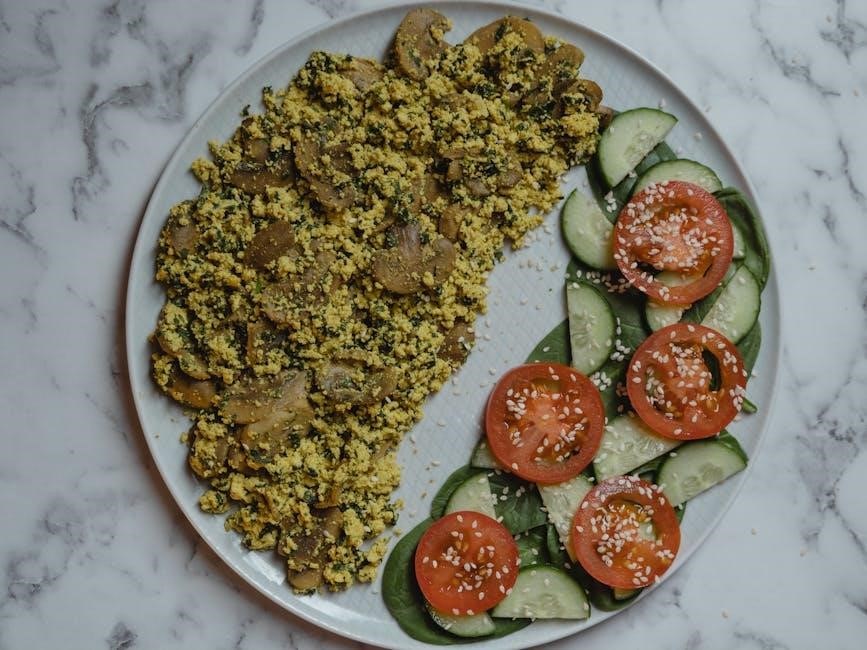
Challenges and Misconceptions
Common challenges include protein deficiency, carb cravings, and social eating difficulties. Misconceptions often surround the restrictiveness of the diet and the need for careful nutritional planning.
Common Mistakes to Avoid
One of the most common mistakes is neglecting fiber intake while reducing carbs, leading to digestive issues. Many overlook the importance of meal timing and portion control, which can hinder weight loss. Relying too heavily on processed low-carb foods is another pitfall, as they may lack essential nutrients. Additionally, some individuals fail to diversify their protein sources, risking nutritional deficiencies. Balancing fats and proteins properly is crucial to avoid plateaus and ensure sustained energy levels throughout the day.
Addressing Misconceptions About Vegetarian Diets
A common misconception is that vegetarian diets lack sufficient protein, but plant-based sources like lentils, tofu, and beans provide ample protein. Another myth is that low-carb vegetarian diets are too restrictive, but with creative meal planning, they can be diverse and flavorful. Some believe these diets are nutritionally incomplete, but with proper planning, they can meet all dietary needs. Dispelling these myths helps individuals embrace the benefits of a high-protein, low-carb vegetarian lifestyle confidently.
